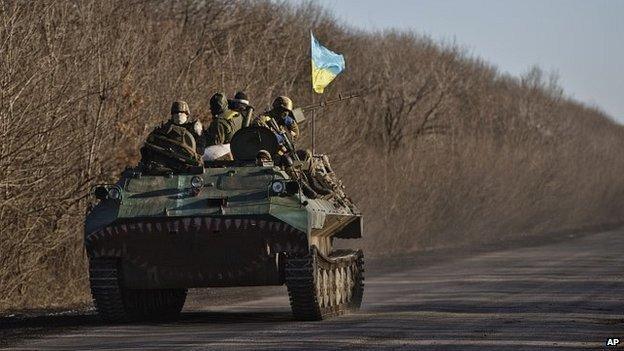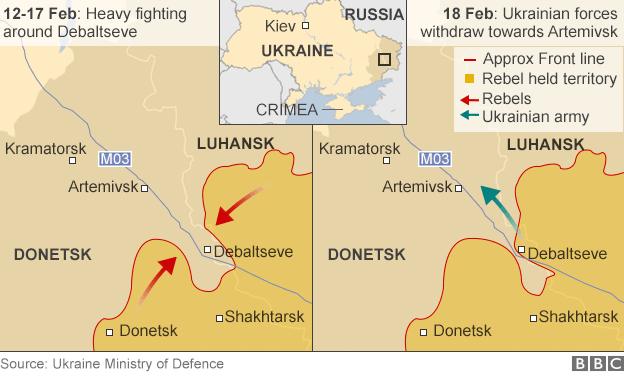Russia accuses Ukraine of aiming to destroy Minsk accords
- Published

President Poroshenko said about 2,500 troops withdrew from Debaltseve on Wednesday
Russia's UN ambassador Vitaly Churkin has denounced Ukraine's call for the deployment of UN peacekeepers in eastern Ukraine as a destructive move.
The Ukrainian president's call "raises suspicions that he wants to destroy the Minsk accords", Mr Churkin said.
The Minsk ceasefire deal was reached a week ago but fighting round the strategic town of Debaltseve saw the withdrawal of Ukrainian troops there.
Shelling significantly increased in the rebel-held city of Donetsk on Thursday.
And Ukrainian officials reported mortar attacks by separatists on the coastal town of Shirokyne, near Mariupol.
'Violation'
Mr Churkin accused Ukrainian President Petro Poroshenko of seeking a new scheme instead of doing what he had signed up to.
"If one proposes new schemes right away, the question arises whether [the accords] will be respected", he said.
The leadership of the self-proclaimed Donetsk People's Republic described the call for peacekeepers as a violation of the Minsk accords.
The leaders of Russia, Ukraine, Germany and France, the four parties to the Minsk accords, held further talks over the phone on Thursday.
The French presidency said the ceasefire breaches were denounced and the leaders called for "the implementation of the full package of measures agreed in Minsk" including a full ceasefire, withdrawal of heavy weapons and the release of prisoners.
President Poroshenko met with troops who withdrew from Debaltseve
Mr Poroshenko called for UN-mandated peacekeepers to enforce the ceasefire after fighting continued following the rebel advance on Debaltseve.
A police mission by the European Union would be the best format for a peacekeeping operation, Mr Poroshenko said on his website.
It would help guarantee security "in a situation where the promise of peace is not being kept", he told an emergency meeting of Ukraine's national security and defence council.

Analysis: Jonathan Marcus, BBC defence and diplomatic correspondent
Could a peacekeeping force help to secure the ceasefire in eastern Ukraine?
Well for a start there would need to be a functioning ceasefire; nobody is going to send troops into an active war zone. Just getting agreement at the UN for such a force might be an insurmountable diplomatic hurdle.
Russia - with a key veto power on the Security Council - is not just an interested bystander. Despite its denials, it is seen by Ukraine and the West as an active participant in the conflict.
An effective peacekeeping force paradoxically might be in nobody's interests. Peacekeepers tend to fix battle lines in place. In Ukraine both sides probably have further ambitions on the ground. The Russian-backed separatists may well want to advance further and the Ukrainian government's forces certainly aspire to take back territory that they have lost.
Many experts fear there is a lot more fighting to be done whether this ceasefire is implemented or not.

Nearly 2,500 Ukrainian soldiers withdrew from Debaltseve on Wednesday.
Ukraine's army said 82 soldiers were still missing on Thursday. Rebels claim to have captured hundreds.
Earlier a senior Ukrainian military official said 22 Ukrainian soldiers had died in Debaltseve over the past three days. Rebel claims of a much higher figure have been dismissed by the government.
Under threat
The ceasefire, which officially came into effect on Sunday, has reportedly seen some heavy weaponry withdrawn by both sides.
However, the BBC's Ian Pannell in Donetsk reported a significant increase in shelling on Thursday, with artillery fire shaking buildings in the city centre.
Meanwhile Ukrainian military spokesman Anatoliy Stelmakh said rebels had attacked the town of Shirokyne with tanks and weaponry.
After the fall of Debaltseve the peace agreement appears to be under serious threat, our correspondent says.

Earlier rebel spokesman Eduard Basurin said Debaltseve was now "completely under the control" of the separatists, with just "scattered" pockets of resistance that were being "neutralised".
Nato chief Jens Stoltenberg said the rebels' offensive had put the wider peace agreement at risk.
The White House said both the rebels and Russia had failed to live up to the terms of the Minsk agreement.
But Russian Foreign Minister Sergei Lavrov insisted the rebels' actions in Debaltseve had not violated the ceasefire because it was a rebel-held city at the time of the agreement.
Footage of Debaltseve captured by a drone showed evidence of shelling
Most of the city's 25,000 population has been evacuated but about 5,000 civilians are still believed to be in the town.
Fighting began in eastern Ukraine in April, a month after Russia annexed the Crimea peninsula.
The UN says more than 5,600 people have been killed, but there are fears the actual death toll could be much higher.
Ukraine's pro-Western government says Russia is supporting the separatists with troops and weapons, but the Kremlin has consistently denied this.

Ceasefire from 00:01 on 15 February (22:01 GMT 14 February)
Heavy weapons to be withdrawn, beginning on 16 February and completed in two weeks - beyond a buffer zone behind the current front line for Ukrainian forces and behind the September front line for separatist forces
All prisoners to be released; amnesty for those involved in fighting
Withdrawal of all foreign troops and weapons from Ukrainian territory. Disarmament of all illegal groups
Ukraine to allow resumption of normal life in rebel areas, by lifting restrictions
Constitutional reform to enable decentralisation for rebel regions by the end of 2015
Ukraine to control border with Russia if conditions met by the end of 2015

Do you live in eastern Ukraine or have friends and family in the region? What do you think about the recent developments? You can email your experiences to haveyoursay@bbc.co.uk, external
Please include a contact number if you wish to be contacted by a BBC journalist.